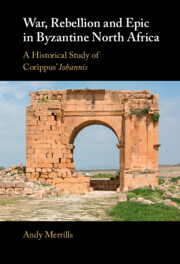Book contents
- War, Rebellion and Epic in Byzantine North Africa
- War, Rebellion and Epic in Byzantine North Africa
- Copyright page
- Dedication
- Contents
- Maps
- Preface
- A Note on Abbreviations, Translations and Maps
- Chapter 1 ‘I Sing of Things That Are Not Unknown’
- Chapter 2 Prelude to a War
- Chapter 3 Past and Future in the Iohannis
- Chapter 4 Corippus and the Moorish World
- Chapter 5 ‘For Every Blade Was Red’
- Chapter 6 Christianity and Paganism in the Iohannis
- Conclusions
- Bibliography
- Index
Conclusions
Published online by Cambridge University Press: 12 October 2023
- War, Rebellion and Epic in Byzantine North Africa
- War, Rebellion and Epic in Byzantine North Africa
- Copyright page
- Dedication
- Contents
- Maps
- Preface
- A Note on Abbreviations, Translations and Maps
- Chapter 1 ‘I Sing of Things That Are Not Unknown’
- Chapter 2 Prelude to a War
- Chapter 3 Past and Future in the Iohannis
- Chapter 4 Corippus and the Moorish World
- Chapter 5 ‘For Every Blade Was Red’
- Chapter 6 Christianity and Paganism in the Iohannis
- Conclusions
- Bibliography
- Index
Summary
The Iohannis remains something of a puzzle. Corippus’ motivations in composing the work, the degree to which he manipulated his knowledge of the recent past to meet his own literary ends and the innumerable details of the poem’s Latin all resist straightforward elucidation. But an appreciation of the delicate political position of Justinianic North Africa at the time of its composition is crucial to appreciating the historical importance of the poem and casts a great deal of light upon the text that survives to us. This in turn allows us to consider the Iohannis as a meaningful source on the early history of imperial rule in the region, and not simply as a repository of discrete points of historical or ethnographic information, or indeed as a thoughtless regurgitation of imperial ‘propaganda’. Repeated political and military convulsions had destabilized the Byzantine occupation almost from its outset, and had left a profound mark upon the economy and society of Africa.1 This pattern can only have been exacerbated by the plague of 543 and (perhaps) by the poor harvests which had struck other parts of the Mediterranean world following the cold snap of 536.
- Type
- Chapter
- Information
- War, Rebellion and Epic in Byzantine North AfricaA Historical Study of Corippus' <i>Iohannis</i>, pp. 258 - 261Publisher: Cambridge University PressPrint publication year: 2023



